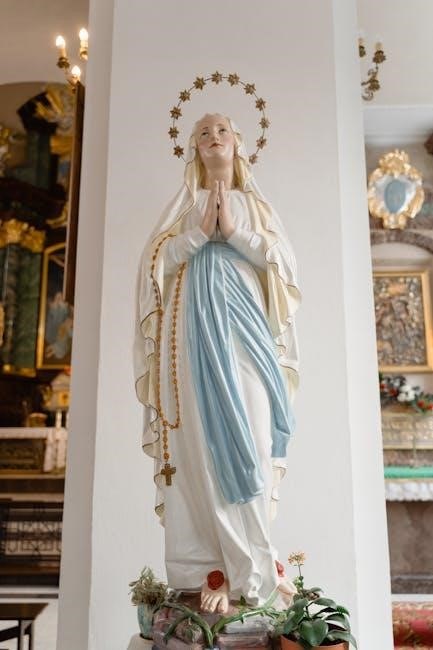Numbers in the Bible carry deep spiritual meanings‚ often symbolizing divine patterns and purposes. The number 40‚ for instance‚ represents testing‚ preparation‚ and transition‚ embodying transformation and renewal.
1.1 The Importance of Biblical Numerology
Biblical numerology uncovers the hidden meanings of numbers in Scripture‚ revealing divine patterns and themes. Numbers like 7‚ 12‚ and 40 hold symbolic significance‚ reflecting God’s order and design. Understanding these numbers provides deeper insight into biblical events and spiritual truths. For example‚ 40 symbolizes testing‚ transition‚ and completion‚ while 7 represents perfection and rest. By studying numerology‚ believers can better comprehend the structure of God’s plan and the richness of His Word‚ bridging the gap between history and prophecy.
1.2 Overview of Key Numbers and Their Meanings
In the Bible‚ specific numbers carry symbolic meanings that enrich the understanding of divine themes. The number 7 represents perfection and completeness‚ as seen in the seven days of creation. The number 12 signifies divine authority and organization‚ such as the twelve tribes of Israel and the twelve apostles. The number 40‚ a focal point of this study‚ symbolizes testing‚ preparation‚ and transformation. These numbers‚ among others‚ reveal God’s orderly design and the deeper spiritual truths embedded in Scripture‚ offering insights into His plan and purpose for humanity.

The Number 40 in Biblical Context
The number 40 in the Bible symbolizes periods of testing‚ transition‚ and preparation‚ often marking significant spiritual journeys or divine transformations‚ as seen in key biblical accounts.
2.1 The Symbolism of 40 as a Period of Testing
The number 40 in the Bible is deeply symbolic‚ often representing a period of testing‚ trial‚ or probation. It signifies a time of refinement‚ where faith and endurance are challenged. This theme is evident in key biblical events‚ such as Noah’s 40 days and nights of rain‚ which tested his faith and purified the earth. Similarly‚ the Israelites spent 40 years in the wilderness‚ a time of divine testing to prepare them for the Promised Land. Even Jesus fasted for 40 days in the wilderness‚ enduring temptation to strengthen His resolve before ministry. Thus‚ 40 symbolizes a transformative process of spiritual growth and divine purpose.
2.2 The Role of 40 in Preparation and Transition
The number 40 in the Bible also signifies preparation and transition‚ marking periods of spiritual and physical readiness. Moses spent 40 years in Egypt and another 40 in the wilderness before leading Israel out of slavery‚ symbolizing divine preparation. Similarly‚ Jesus fasted for 40 days in the wilderness‚ preparing for His public ministry. This pattern reflects a divine process of transformation‚ where individuals or communities are readied for new roles or covenantal relationships. The use of 40 underscores a sacred timeframe for growth‚ enabling individuals to transition into fulfilling God’s purpose. It symbolizes a period of divine refinement and empowerment.

Key Biblical Events Involving the Number 40
The number 40 is prominent in key biblical events‚ such as Noah’s 40 days of rain‚ the Israelites’ 40 years in the wilderness‚ and Jesus’ 40-day fast‚ symbolizing testing‚ transformation‚ and preparation.
3.1 Noah and the Great Flood (40 Days and Nights)
The Great Flood‚ lasting 40 days and nights‚ signifies divine judgment and purification. This period symbolizes a time of testing Noah’s faith and humanity’s corruption. The 40 days represented transformation‚ as the flood cleansed the earth and restored life. This event marks the first major occurrence of the number 40 in Scripture‚ setting a pattern for future instances of testing and renewal. The flood’s duration underscores God’s mercy and covenant promise‚ establishing a foundational theme of redemption and new beginnings in biblical history.
3.2 Moses and the Exodus (40 Years in the Wilderness)
Moses’ 40 years in the wilderness symbolize a period of testing and preparation for the Israelites. This era was marked by trials‚ such as the golden calf incident‚ highlighting their need for spiritual growth. The 40 years also signified transition‚ as the rebellious generation passed away‚ making way for a new generation ready to enter the Promised Land. This period underscores themes of purification‚ faith‚ and divine guidance‚ preparing the Israelites for their covenantal destiny under Moses’ leadership.
3.3 Jesus and the Wilderness Temptation (40 Days of Fasting)
Jesus’ 40-day fast in the wilderness marks a pivotal moment of spiritual preparation before His ministry began. This period‚ mirroring the Israelites’ wilderness journey‚ symbolized testing and triumph over temptation. Fasting and isolation allowed Jesus to deepen His connection with God‚ demonstrating His obedience and readiness to fulfill His divine mission. The wilderness temptation‚ led by Satan‚ highlighted Jesus’ resistance to sin‚ showcasing His divine authority and humanity. This 40-day period emphasizes spiritual purification‚ self-discipline‚ and the importance of surrendering to God’s will‚ aligning with the biblical theme of 40 as a time of trial and transformation.

The Spiritual Meaning of 40
The number 40 symbolizes testing‚ preparation‚ and transition‚ representing purification‚ completion‚ and divine judgment. It often signifies a generation or epoch‚ marking spiritual renewal and transformation.
4.1 Representing a Generation or Epoch
The number 40 in the Bible often signifies a generation or epoch‚ marking significant transitions in history. It represents a complete cycle of time‚ such as the Israelites’ 40 years in the wilderness‚ symbolizing a generation’s journey from rebellion to renewal. Moses’ life is divided into three 40-year periods‚ reflecting transformative phases. Similarly‚ judges like Othniel‚ Deborah‚ and Gideon ruled for 40 years‚ indicating a divine pattern of leadership and renewal. Thus‚ 40 embodies not just a literal duration but a symbolic completion‚ preparing for new beginnings and spiritual growth.
4.2 Symbolizing Purification and Completion
The number 40 in the Bible symbolizes purification and completion‚ marking the end of one phase and the beginning of another. For instance‚ Noah’s 40 days of rain purified the earth from corruption‚ and Moses’ 40 years in the wilderness prepared the Israelites for the Promised Land‚ signifying the end of their rebellion. Similarly‚ Jesus’ 40-day fast in the wilderness represented His purification and preparation for ministry. These periods emphasize cleansing‚ readiness‚ and alignment with divine plans‚ often leading to renewal and the fulfillment of God’s purposes.
4.3 Association with Judgment and Trial
The number 40 in the Bible is often associated with judgment and trial‚ symbolizing divine evaluation and purification. Noah’s 40 days of rain signified God’s judgment on a corrupt world‚ while the Israelites’ 40 years in the wilderness represented a period of testing and refinement. Similarly‚ Jesus’ 40-day fast in the wilderness mirrored these themes‚ preparing Him for ministry. These instances illustrate how 40 embodies not only testing but also divine justice‚ highlighting the necessity of purification and alignment with God’s will before entering a new phase of His plan.

The Number 40 in the Old Testament
The number 40 appears frequently in the Old Testament‚ symbolizing testing and preparation. Notable examples include Noah’s 40 days of rain‚ the Israelites’ 40-year wilderness journey‚ Moses’ 40 years in Midian‚ and King Saul’s 40-year reign‚ each highlighting divine judgment‚ purification‚ and transition.
5.1 The Wilderness Wanderings of the Israelites
The Israelites’ 40-year journey in the wilderness is a pivotal example of the number 40 in the Old Testament. This period symbolized divine judgment and purification‚ as the generation that refused to enter Canaan was not allowed to see the Promised Land. The wilderness became a place of testing‚ where God provided manna and water‚ demonstrating His faithfulness despite the people’s rebellion. This 40-year ordeal marked a transition from slavery in Egypt to preparation for life in Canaan‚ emphasizing themes of trust‚ obedience‚ and God’s patient guidance.
5.2 The Judges of Israel (Othniel‚ Deborah‚ Barak‚ Gideon)
The number 40 appears significantly in the roles of several judges in Israel. Othniel judged Israel for 40 years‚ establishing peace following his victory over Cushan-Rishathaim. Deborah and Barak’s leadership led to a 40-year peace after defeating Sisera. Gideon‚ who also judged Israel for 40 years‚ exemplified humility and trust in God‚ defeating Midian with just 300 men. These instances highlight the number 40 as a period of divine-appointed leadership‚ bringing order and restoration to Israel‚ underscoring God’s providence and the importance of faithful obedience during times of trial and transition.
5.3 The Reign of King Saul (40 Years)
Kings Saul’s reign over Israel lasted 40 years‚ marking a significant period in Israel’s history. His rule began with promise but ended in tragedy due to disobedience and pride. The number 40 here symbolizes a generation under Saul’s leadership‚ during which Israel transitioned from a tribal confederation to a monarchy. However‚ Saul’s failure to obey God fully led to his downfall‚ paving the way for David’s rise. This 40-year period reflects both the potential for leadership and the consequences of unfaithfulness‚ highlighting God’s sovereignty and the importance of obedience in leadership.

The Number 40 in the New Testament
The number 40 in the New Testament signifies spiritual preparation and divine timing. Jesus fasted for 40 days‚ symbolizing His readiness for ministry‚ while the 40 days after His resurrection prepared the disciples for the Church’s birth.
6.1 Jesus’ 40-Day Fast in the Wilderness
Jesus’ 40-day fast in the wilderness marks a pivotal moment of spiritual preparation before His public ministry. This period‚ mirroring the Israelites’ 40-year wilderness journey‚ symbolized testing and purification. Jesus resisted Satan’s temptations‚ demonstrating divine obedience and readiness to fulfill His mission. The fast underscored themes of surrender‚ trust in God‚ and victory over sin‚ setting the stage for His transformative work. This act of discipline and faith highlights the significance of 40 as a time of trial and spiritual refinement‚ aligning with biblical patterns of preparation for divine purposes.
6.2 The 40 Days Between Resurrection and Ascension
The 40 days following Jesus’ resurrection hold profound spiritual significance. During this period‚ Jesus appeared to His disciples‚ providing undeniable proof of His resurrection and imparting final teachings. This time served as a transition‚ preparing the disciples for the ascension and the coming of the Holy Spirit at Pentecost. The 40-day interval symbolizes completion and readiness‚ mirroring earlier biblical patterns of preparation. It underscores the continuity of divine purpose‚ bridging the gap between Christ’s earthly ministry and the establishment of the church‚ emphasizing the transformative power of resurrection and the empowerment of believers.
6.3 The Significance of 40 in Revelation
In Revelation‚ the number 40 symbolizes a complete period of divine judgment and preparation. It appears in contexts like the 40 days of rain in Noah’s story and the 40 months of testing for the two witnesses. This mirrors earlier biblical patterns‚ where 40 represents a time of testing‚ trials‚ or transformation. Revelation’s use of 40 underscores the continuity of biblical numerology‚ emphasizing God’s sovereignty and the fulfillment of His plan. It signifies the culmination of human history‚ preparing believers for eternal life and the ultimate triumph of God’s kingdom over evil.

The Number 40 in Jewish Tradition
In Jewish tradition‚ the number 40 symbolizes testing‚ transformation‚ and divine providence‚ as seen in the wilderness wanderings and Noah’s 40 days of rain‚ reflecting faith and renewal.
7.1 The 40 Years of Wandering as a Test of Faith
The 40 years of wandering in the wilderness were a pivotal test of faith for the Israelites‚ symbolizing purification and preparation. This period‚ marked by trials and divine provision‚ shaped their identity as God’s chosen people. It taught reliance on God’s guidance and provision‚ reinforcing trust amidst adversity. The wilderness experience was not just a physical journey but a spiritual transformation‚ preparing them for the Promised Land and their covenantal responsibilities. This narrative remains a powerful metaphor for faith‚ perseverance‚ and divine faithfulness in Jewish tradition.
7.2 The 40 Days of Rain in Noah’s Story
The 40 days of rain in Noah’s story symbolize divine judgment and renewal. This period marked a cleansing of the earth‚ washing away corruption and paving the way for a new beginning. Noah’s obedience and faith during this trial exemplified trust in God’s plan. The floodwaters‚ lasting 40 days and nights‚ represented both destruction and rebirth‚ emphasizing God’s sovereignty and mercy. This event underscores the transformative power of divine intervention‚ aligning with the broader theme of 40 as a period of testing and purification in Jewish tradition.
7.3 The 40 I AM Statements in Spiritual Reflection
The 40 “I AM” statements hold profound spiritual significance‚ reflecting divine identity and purpose. These declarations‚ found throughout Scripture‚ reveal God’s nature and humanity’s relationship with Him. In spiritual reflection‚ confessing these statements daily fosters self-awareness and alignment with God’s perspective. They emphasize transformation‚ renewal‚ and trust in divine sovereignty. This practice deepens faith‚ mirroring the 40-day periods of testing and preparation in biblical narratives‚ such as Noah’s flood and Jesus’ wilderness fasting‚ symbolizing purification and spiritual growth.

The Number 40 in Christian Tradition
The number 40 holds deep significance in Christian tradition‚ symbolizing preparation‚ renewal‚ and spiritual growth. It is reflected in Lent’s 40-day fasting period‚ mimicking Jesus’ wilderness fasting‚ and in the veneration of the 40 Martyrs‚ emphasizing endurance and faith.
8.1 The 40 Days of Lent
Lent‚ a 40-day period in Christian tradition‚ symbolizes spiritual preparation and renewal. It mirrors Jesus’ 40-day fasting in the wilderness‚ emphasizing prayer‚ reflection‚ and sacrifice. This sacred time helps believers connect with Christ’s journey‚ fostering humility and devotion. By abstaining from certain pleasures‚ Christians reflect on their sins and seek spiritual growth. Lent’s 40 days highlight the number’s biblical significance‚ representing transformation and divine preparation‚ while culminating in Easter’s celebration of resurrection and renewal.
8.2 The 40 Martyrs and Their Significance
The 40 Martyrs of Sebaste‚ a group of Roman soldiers martyred for their Christian faith‚ symbolize enduring devotion and sacrifice. Their story‚ rooted in early Christian tradition‚ reflects the biblical significance of 40 as a period of trial and triumph. Exposed to extreme cold and eventually executed‚ their unwavering faith exemplified spiritual resilience. This event is commemorated in the Eastern Orthodox Church‚ highlighting their role as models of steadfast belief. The number 40‚ in this context‚ underscores the completion of a divine trial‚ mirroring biblical themes of testing and ultimate victory through faith.
8.3 The 40-Day Mourning Period in Early Christianity
The 40-day mourning period in early Christianity‚ known as the “40-Day Lament‚” held profound spiritual significance. It mirrored the biblical use of 40 as a period of preparation and reflection. This practice‚ rooted in Jewish traditions‚ emphasized purification and devotion. Early Christians observed this period to honor the departed‚ seeking comfort and spiritual renewal. The duration symbolized completion of earthly trials‚ aligning with biblical themes of testing and transition. This custom remains a testament to the enduring influence of numerical symbolism in shaping Christian practices and communal expression of faith.

Cultural and Historical Context of the Number 40
The number 40 is often used as a symbolic round number in Scripture‚ representing completeness or a generation. It appears in various cultural and religious contexts‚ signifying transformation and divine order.
9.1 The Use of 40 as a Round Number in Scripture
In biblical narratives‚ 40 frequently serves as a rounded figure symbolizing completeness or a significant period. It is used to emphasize divine patterns‚ such as Noah’s flood lasting 40 days and nights‚ and the Israelites wandering 40 years to signify a generation. This practice highlights the number’s role in conveying spiritual truths rather than exact durations‚ making it a powerful tool for theological storytelling and emphasizing God’s intentions in human history.
9.2 The Symbolism of 40 in Other Religious Traditions
The number 40 holds symbolic significance beyond the Bible‚ appearing in various religious and cultural contexts. In Islam‚ the 40 Hadiths of Imam al-Nawawi are revered for spiritual guidance. In Sufism‚ the “40 Rules of Love” by Rumi emphasize spiritual transformation. Hinduism associates 40 days with periods of meditation and self-reflection‚ such as in the Mahabharata. These cross-cultural references highlight the universal symbolism of 40‚ often representing periods of purification‚ introspection‚ and spiritual growth‚ transcending specific religious boundaries to resonate deeply within human consciousness and divine narratives.
9.3 The Historical Significance of 40 in Ancient Near Eastern Cultures
The number 40 holds significant historical meaning in Ancient Near Eastern cultures‚ reflecting broader symbolic patterns. In Mesopotamia‚ the Epic of Gilgamesh describes a 40-day flood‚ paralleling Noah’s story. The Sumerians and Babylonians often used 40 as a standard measure‚ symbolizing completeness or divine judgment. Egyptian culture associated 40 with cosmic order and renewal. These traditions influenced biblical numerology‚ where 40 became a marker of testing‚ transition‚ and transformation‚ echoing its earlier cultural and historical roots in the region;

The Number 40 in Modern-Day Application
The number 40 continues to inspire modern spirituality‚ symbolizing periods of reflection and growth. Many Christians observe Lent for 40 days‚ mirroring Jesus’ wilderness fasting‚ to deepen faith and renewal.
10.1 Using 40-Day Bible Reading Plans for Spiritual Growth
40-day Bible reading plans have become a popular tool for spiritual growth‚ encouraging believers to engage deeply with Scripture. These plans often align with key biblical events‚ such as Jesus’ 40-day fast in the wilderness‚ symbolizing preparation and renewal. By dedicating 40 days to focused study‚ individuals can foster consistency in their devotional life‚ gain deeper insights into God’s Word‚ and experience personal transformation. This practice mirrors the biblical pattern of 40 as a period of testing and purification‚ making it a meaningful way to seek spiritual renewal in modern times.
10.2 The Significance of 40 in Personal Faith Journeys
The number 40 holds profound meaning in personal faith journeys‚ symbolizing periods of testing‚ transformation‚ and spiritual growth. Many believers adopt 40-day practices‚ such as fasting or focused prayer‚ to mirror biblical examples like Jesus’ wilderness temptation. This duration often represents a season of purification‚ where individuals draw closer to God and refine their faith. By embracing the symbolism of 40‚ Christians can experience renewal‚ clarity‚ and preparation for new phases of their spiritual lives‚ aligning their personal journeys with the divine patterns seen in Scripture.
10.3 The Role of 40 in Modern Christian Practices
The number 40 continues to inspire modern Christian practices‚ fostering spiritual growth and reflection. Many churches observe Lent‚ a 40-day period of preparation before Easter‚ emphasizing repentance and renewal. Additionally‚ 40-day Bible reading plans and prayer cycles are popular tools for deepening faith. Some communities adopt 40-day fasting or acts of service‚ mirroring biblical examples of testing and transformation. These practices help believers connect with the timeless symbolism of 40‚ using it as a catalyst for personal and collective spiritual renewal‚ while honoring its rich biblical and cultural heritage.
